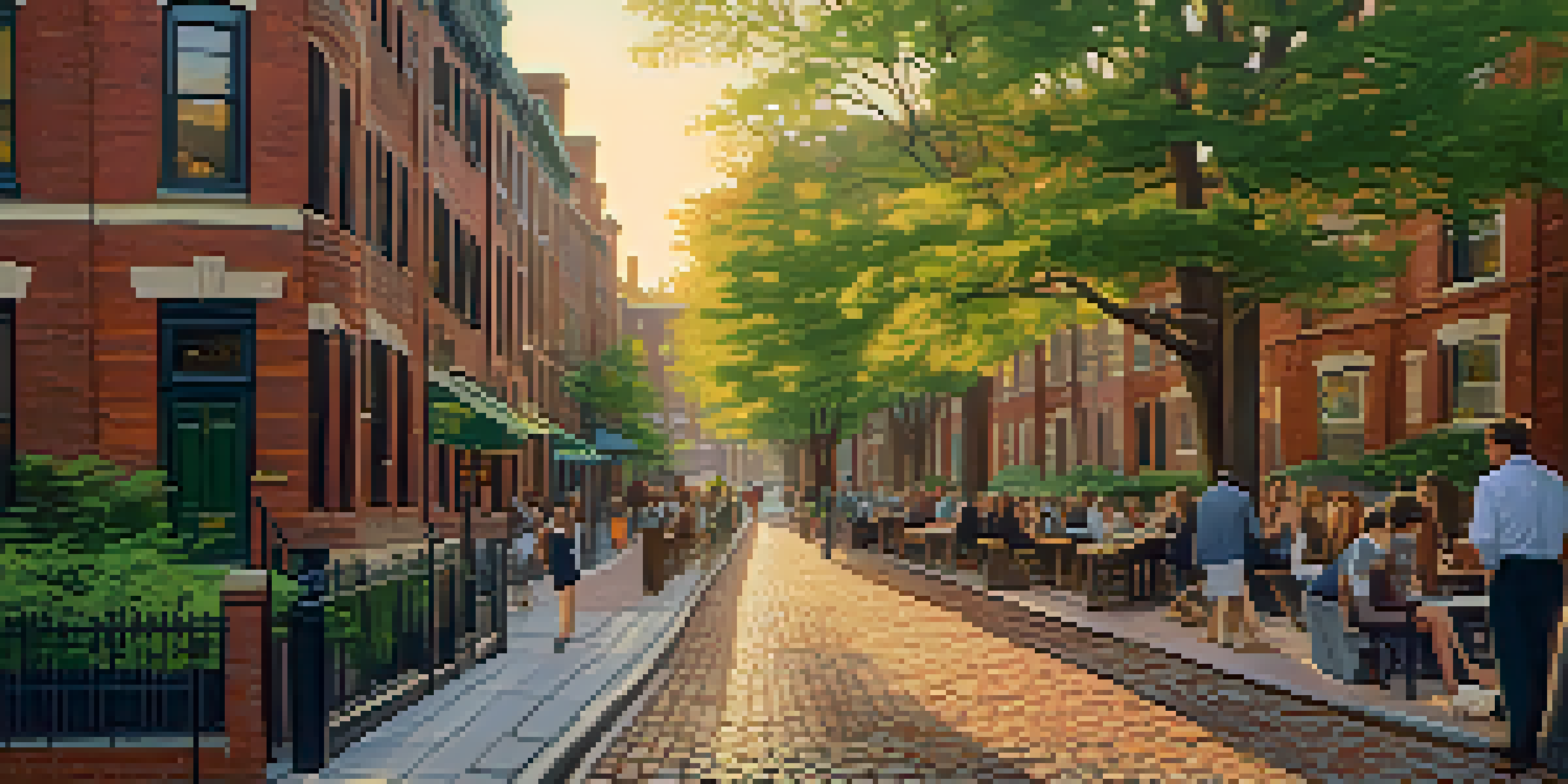Boston's Role in the Development of American Poetry

The Historical Context of Boston and Poetry
Boston, often referred to as the 'Cradle of Liberty,' has a rich cultural history that greatly influenced American poetry. In the 19th century, it emerged as a hub for literary talent, attracting writers and thinkers who sought to explore new ideas. This environment fostered creativity and collaboration, crucial elements for the development of a distinct American poetic voice.
I am not bound to win, but I am bound to be true. I am not bound to succeed, but I am bound to live by the light that I have.
The city's vibrant intellectual scene, highlighted by institutions like Harvard University, provided a fertile ground for poets to thrive. Many poets were inspired by the transcendentalist movement, which emphasized nature, individualism, and spirituality. As a result, Boston became a breeding ground for innovative literary expressions that challenged traditional norms.
Notable figures such as Ralph Waldo Emerson and Henry Wadsworth Longfellow called Boston home, contributing to its reputation as a center for poetry. Their works reflected the societal changes of their time and helped pave the way for future generations of poets. Thus, Boston's historical context set the stage for a rich poetic tradition.
The Transcendentalist Movement's Influence
The transcendentalist movement in the early 19th century had a profound impact on American poetry, with Boston at its epicenter. Poets like Emerson and Walt Whitman espoused the belief that individuals could transcend the physical world and connect with the divine through nature and intuition. This philosophy reshaped how people viewed poetry, emphasizing personal experience and emotional truth.

Emerson's essays and poems encouraged writers to explore their inner thoughts and feelings, challenging them to break free from European poetic conventions. His advocacy for self-reliance resonated with many and inspired poets to seek their unique voices. This shift was instrumental in establishing an authentic American literary identity.
Boston: Cradle of American Poetry
Boston's rich cultural history and intellectual environment fostered a unique poetic voice that significantly shaped American literature.
Moreover, the transcendentalists' focus on nature inspired a wealth of poetic imagery that continues to influence writers today. By celebrating the natural world and its connection to the human spirit, these poets laid the groundwork for future movements in American poetry. This legacy of transcendentalism remains a vital part of Boston's poetic heritage.
The Role of Boston's Literary Institutions
Boston's universities and literary societies played a crucial role in nurturing poetic talent. Harvard University, in particular, became a beacon for aspiring poets, fostering an environment of intellectual exchange and artistic innovation. The presence of esteemed professors and writers created opportunities for mentorship and collaboration, essential for developing new literary voices.
The only way to make sense out of change is to plunge into it, move with it, and join the dance.
In addition to universities, literary clubs and salons thrived in Boston, providing platforms for poets to share their work and ideas. These gatherings not only facilitated networking but also sparked discussions that influenced the direction of American poetry. The encouragement and feedback from peers helped poets refine their craft and gain recognition.
Furthermore, Boston's publishing industry contributed to the dissemination of poetry, making it accessible to a wider audience. Local presses published anthologies and collections, showcasing the works of both established and emerging poets. This support system was vital in shaping the city's literary landscape and fostering the next generation of poetic talent.
The Impact of the Civil War on Boston Poets
The Civil War marked a significant turning point in American poetry, and Boston poets were at the forefront of this transformation. The conflict inspired a wave of patriotic and reflective poetry, as writers grappled with the complexities of war and its impact on society. Poets like James Russell Lowell and Emily Dickinson responded to the turmoil through their poignant verses.
Lowell, a prominent figure in Boston's literary scene, used his poetry to advocate for social justice and anti-slavery sentiments, reflecting the city's progressive values. His work resonated with many who were deeply affected by the war, capturing the emotional turmoil of the era. In contrast, Dickinson's introspective poems explored themes of life, death, and nature, revealing a more personal response to the chaos around her.
Transcendentalism's Lasting Impact
The transcendentalist movement, centered in Boston, emphasized personal experience and nature, influencing generations of American poets.
This period not only highlighted the resilience of Boston poets but also showcased how their work could inspire change and provoke thought. The war's influence led to a rich body of poetry that addressed the moral dilemmas of the time, ultimately shaping the evolution of American literature. The legacy of these poets continues to be felt in contemporary discussions about war and peace.
The Bostonian Poetic Voice in the 20th Century
As the 20th century unfolded, Boston continued to be a significant force in the evolution of American poetry. The city embraced modernism, a movement that sought to break away from traditional forms and explore new styles and themes. Poets like Robert Lowell and Elizabeth Bishop emerged from Boston's literary landscape, bringing fresh perspectives to the art of poetry.
Lowell, often regarded as a confessional poet, delved into personal experiences and emotions, challenging readers to confront difficult truths. His work reflected the complexities of identity and mental health, marking a departure from earlier poetic conventions. Similarly, Bishop's meticulous attention to detail and vivid imagery provided a unique lens through which readers could engage with the world.
Boston's literary community remained supportive, providing a nurturing environment for these poets to flourish. The city's commitment to literature and the arts ensured that emerging voices were heard and celebrated. As a result, Boston solidified its reputation as a vital center for poetic innovation in the 20th century.
The Influence of the Boston Poetry Scene Today
Today, Boston's poetry scene continues to thrive, with a rich tapestry of voices contributing to the literary landscape. Local readings, open mics, and poetry slams foster a sense of community among poets, encouraging them to share their work and connect with audiences. This vibrant atmosphere not only celebrates established poets but also nurtures newcomers who aspire to make their mark.
Furthermore, Boston's literary festivals and workshops provide platforms for poets to hone their craft and gain exposure. Events like the Boston Book Festival and the Boston Poetry Marathon showcase a diverse range of poetic styles and themes, highlighting the city's ongoing commitment to the art form. This support for poetry ensures that Boston remains a significant player in the national literary conversation.
Boston's Poetry Scene Today
Today, Boston continues to nurture a vibrant poetry community, supporting both established and emerging voices through various literary events and institutions.
Moreover, the city's educational institutions continue to produce talented poets who contribute to the ongoing evolution of American poetry. With programs dedicated to creative writing and literature, Boston nurtures the next generation of poets who will carry on its rich literary tradition. The influence of Boston's poetry scene is undeniably strong, shaping both local and national poetic discourse.
Boston's Legacy in American Poetry
Boston's legacy in American poetry is both profound and enduring, cementing its status as a cornerstone of literary innovation. The city's rich history, from the transcendentalists to modern poets, showcases a continuous evolution of thought and expression. Each generation of poets has built upon the work of their predecessors, creating a vibrant dialogue that transcends time.
The themes explored by Boston poets often reflect broader societal issues, making their work relevant to contemporary audiences. Their ability to capture the human experience—be it through love, loss, or social justice—ensures that their voices resonate with readers today. This legacy not only honors the past but also inspires future poets to engage with their own realities.

Ultimately, Boston's role in shaping American poetry is a testament to the power of place in influencing artistic expression. The city's unique blend of history, culture, and intellectualism continues to inspire poets and readers alike. As we celebrate Boston's poetic heritage, we recognize its lasting impact on the literary landscape of America.